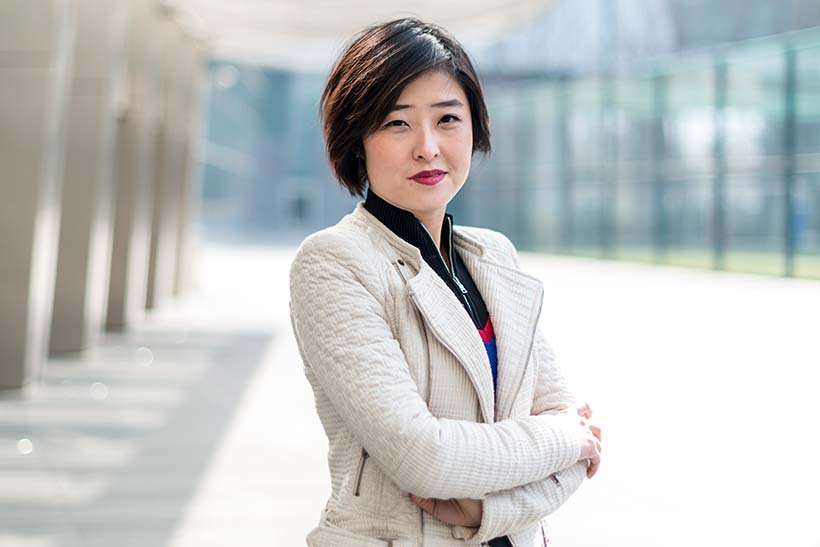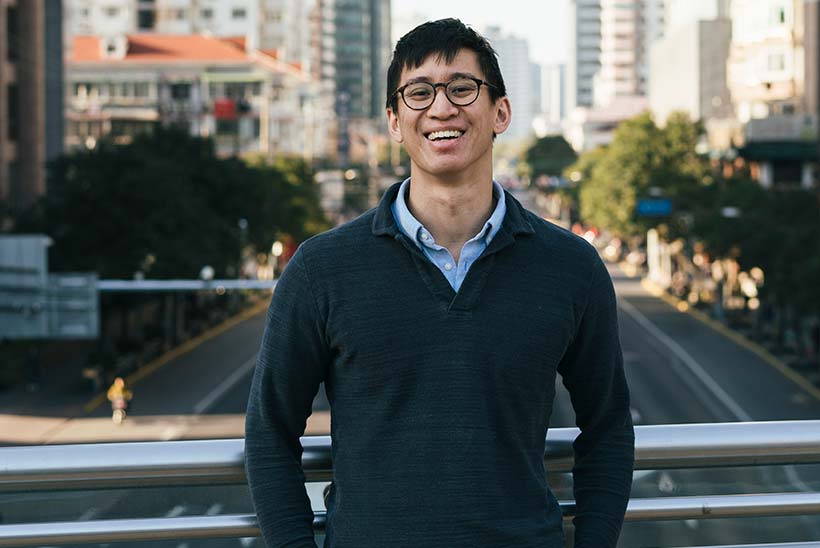
FANGDA WAN ’10 jumped from a law career into entrepreneurship. She credits Amherst philosophy courses with teaching her how to use sound analysis to critique previously held beliefs. PHOTOGRAPHED BY ALEX HOFFORD ON MARCH 2, 2018, IN BEIJING
When Fangda Wan ’10 returned to her hometown in China after living in the United States for eight years, she faced a curious social pressure. She had earned two degrees and a job at a top law firm. Yet at the age of 27, her top priority, according to her parents, should be to find a husband.
Such advice is not uncommon in China, where a high premium placed on family translates to intense pressure for young women to marry. For Wan, it also translated into a business idea. Wan noticed how the Chinese Internet space was blossoming with ample funding and fresh startups that were creating rather than just copying (a common criticism in the past). Sensing an opportunity, she quit her full-time job as a lawyer in Beijing to start her own company in 2014. Nis, whose name translates to “Yours,” is a mobile lifestyle platform that empowers young women to undertake pursuits outside of the family through articles and an online community. Thousands of women signed up.
“When I started the platform, I wanted to show my parents and everyone else that things could be different,” Wan says. “The mentality that to find and keep a good husband is the ultimate goal of my life—I found it unreasonable in a way.”
Wan is among a handful of young Amherst alumni who, in recent years, have lived, worked and founded businesses in a rapidly transforming China. Over the past few decades, the world’s second-largest economy has grown from being the world’s factory to a market leader in areas such as mobile technology and artificial intelligence. A ballooning middle class has more power to consume than ever before. China is already the biggest exporter of both students and tourists abroad. It’s enough to make many curious, passionate young people want to shape, rather than just experience, the change. Here are the stories of three of them.

For ELI HARRIS ’15, being physically close to the factories has been key. Making a prototype can take a week or a month for a global company. For EcoFlow, the turnaround is as little as one day. PHOTOGRAPHED BY ALEX HOFFORD ON MARCH 1, 2018, IN SHENZHEN
Where Wan saw potential in a lifestyle site, Eli Harris ’15 saw the same in hardware. After graduating from Amherst with a degree in Asian languages and civilizations, Harris, who is from Santa Barbara, Calif., moved to the southern Chinese city of Shenzhen to work for DJI, the world’s largest drone maker.
His first stint as an entrepreneur had been at Amherst, where he and three friends founded a business that collected discarded dorm furniture and appliances in May, cleaned them and stored them to resell in the fall. Harris also started the club soccer team after successfully lobbying the board of trustees to change a rule that disallowed club sports in the same sport as a varsity team. “It taught me: there’s no need to fit into existing molds if they don’t fit for you,” he says, “and it’s OK to build a community on your own.”
In China, Harris, who is fluent in Mandarin, first tried his hand at other entrepreneurial endeavors. There was the business trading ginseng root between the United States and China (“I lost a lot of money flying rich Chinese people to Wisconsin”), and the ones importing California wine to China and treating polluted water. None panned out.
While at DJI, he became intrigued by batteries. The battery market had huge fuel generators that provide industrial energy, and pocket-sized power banks that run your phone—but there was little in the middle. Through his job, he already had a few connections to the local factories. Why not fill the gap himself? Thus was born EcoFlow Tech in 2016. The company makes portable batteries that can charge more than 10 mid-sized electronics, such as mini-fridges and electric guitars, all at once.
Being physically close to battery factories has been key, because it speeds up the process from conception to manufacturing. Making a prototype can take a week or a month for a global company. But for Shenzhen-based EcoFlow, the turnaround time is one day to one week. Shenzhen—the southern Chinese megacity of more than 11 million people—produces parts for nearly every consumer electronic in the world. It’s also a vibrant startup hub and home to one of China’s three biggest Internet companies. “There’s so much happening here,” Harris says. “It’s really cool to feel like I’m on the ground floor of being a part of that change.”
EcoFlow now has more than $1 million in pre-order sales, has raised more than $4 million in funding and plans to launch two new batteries this year. Forbes named Harris a “30 Under 30” entrepreneur in the energy sector for 2018.
That’s not to say it’s been easy. When I ask him to name the hardest part of starting his own company, he replies, “Everything.” Harris says he sleeps four hours a night, averages 10 cups of coffee a day and has not exercised or gone on a date in months. “I know it’s unsustainable,” he says, “but we would not survive otherwise. Hardware is an unforgiving game.”

By default more than anything else, JASON KUNG ’08 considered careers in finance and law. But while teaching in China after graduating from Amherst, he came up with a business idea. PHOTOGRAPHED BY ALGIRDAS BAKAS ON FEB. 23, 2018, IN SHANGHAI
Harris credits Jason Kung ’08 with introducing him to the idea of living and working in China. Harris first visited the country through a summer exchange program that Kung had founded for Five College students.
Kung grew up in Hong Kong and majored in political science. By default more than anything else, he considered careers in finance and law. But while teaching in Hangzhou, China, after graduation, he came up with the idea for the exchange program. His most cherished memories from that year include befriending students (whose weddings he’s now attended and whose babies he’s met) and living in a small community amid rolling tea fields on the outskirts of the city. “I had such a great experience being in a place that was so alive and different,” he says. “I wondered: how could I recreate this for other students?”
After running the exchange program for four years and also working in college counseling, Kung co-founded his own education consulting business in 2015. Ivyuan mentors and prepares Chinese students to apply to and attend international universities. It has expanded internationally and now employs around 60 people.
Parents of only children in China plow significant resources into their child’s education if they are able—a phenomenon detailed by Vanessa Fong ’96, Amherst professor and expert in China’s one-child policy (see “Only Time Will Tell,” Summer 2017). For those who can afford it, studying abroad is increasingly preferred to the hyper-competitive and regimented education system at home. This has spawned a dizzying test prep culture: Kung says that once, a mother who was only a few months pregnant walked into his office seeking advice on college planning. (He told her it was a bit early.)
Today, he encourages students to look beyond grades. He’s worked with one student from a shantytown outside Shanghai who is involved in local art programs for migrants. Another student performs stand-up comedy and created an augmented reality startup (that was later sold to Microsoft). He also helps kids with typical teenage problems—peer pressure, their parents’ divorce. “It’s fulfilling for me to be an outside counsel for them, someone without an agenda,” says Kung.
As China’s economy boomed early this decade, funding increased for homegrown startups.
As China’s economy boomed in the 2010s, funding for homegrown startups increased and innovation hubs abounded. Wan, attracted to the “energy and spirit of entrepreneurs,” says she was the first person to ask her law firm for a first-year placement in Beijing, rather than in New York or London. Looking back on her jump into entrepreneurship, she credits Amherst philosophy courses for teaching her how to use sound analysis to critique previously held beliefs—and for giving her the confidence to do so. That ability was essential to her business idea.
Today, Wan maintains Nis as a side project after taking a full-time job at a Chinese technology company in Beijing. One side effect of her first experiment in entrepreneurship: it’s helped her parents see their daughter not so much as an outlier but as a member of a growing population of independent Chinese women who are choosing to wed later.
It’s harder now to be an entrepreneur in China than in the rollicking time just a few years ago. Tighter regulations and the dominance of huge companies make it more challenging for the little guys. (Kung attributes his success not only to good luck and a good idea but also to timing.) Still, these are by no means insurmountable roadblocks.
“The big draw for me was not knowing what to expect,” says Kung. “That allowed me to think of possibilities I didn’t previously think of.”
Fear of failure—that nagging voice that stops so many ideas from being executed—is not a
debilitating concern for Harris, Kung or Wan. The excitement of creating something new, in their eyes, trumps whatever may be seen as sacrifices.
Wan has friends who told her it was risky to quit a full-time job. But she doesn’t see it like that.
“I felt like, OK, if I really want to learn how to do this, I should just start doing it. Observing other people is not going to help you to get there,” she says. She’s now mulling her next startup idea.
Anjie Zheng ’10 is a writer and former Wall Street Journal reporter in Hong Kong.